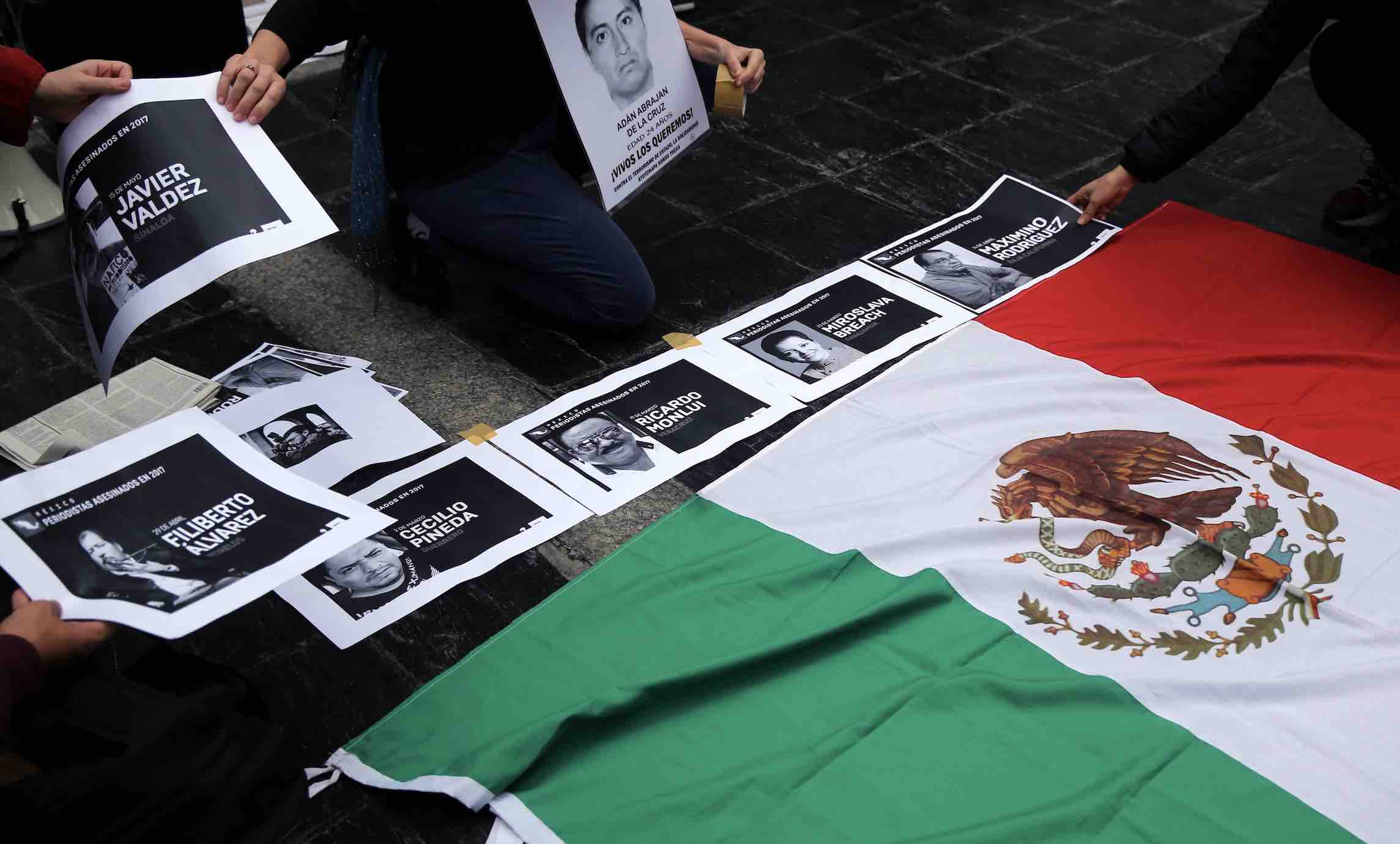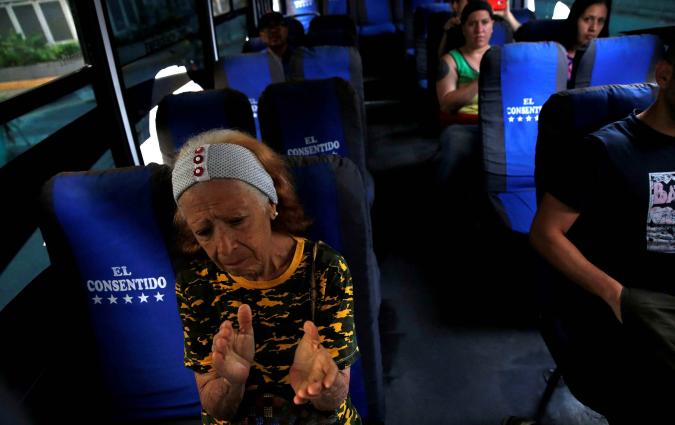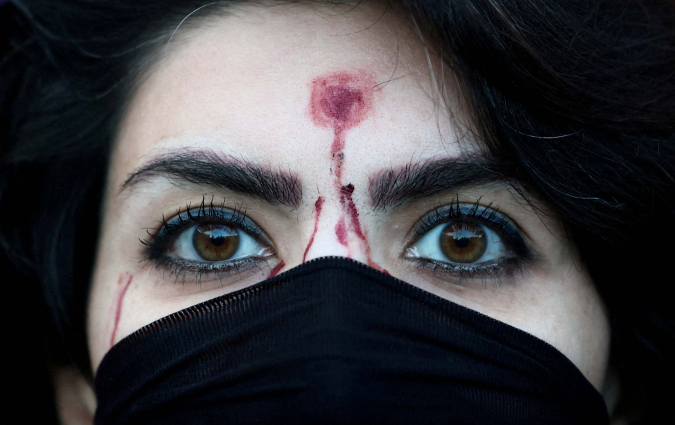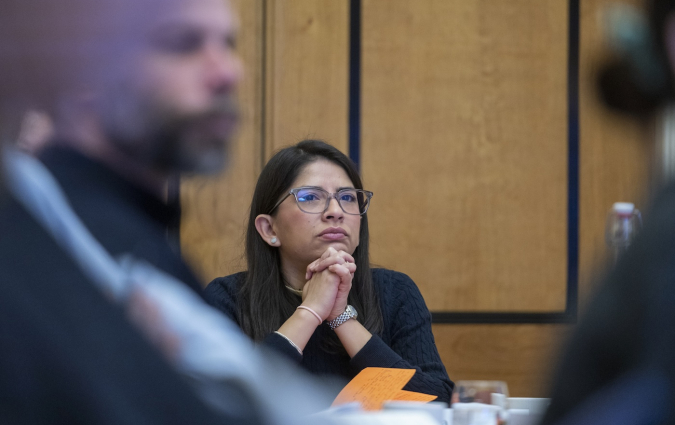This project remembers slain Mexican journalists for their work, not their deaths

People place photos of murdered journalists next to the national Mexican flag in Buenos Aires. Reuters/Marcos Brindicci
Mexico marked World Press Freedom Day earlier this month by recording the 122nd murder of a journalist in the line of duty. Benjamín Morales Hernández’s bullet-ridden body was found dumped on the road side in Mexico’s northwestern state of Sonora. UNESCO Director-General Audrey Azoulay condemned the killing and called on authorities to “investigate and prosecute this crime to the full extent of the law”.
Alejandra Ibarra Chaoul, who will memorialise Hernández’s work on her website Defensores de la Democracia, said: “Instead of remembering slain journalists by the crimes that took their lives, we should know about them because of the work they did. In order to understand the risks local Mexican journalists took, you need to understand the rich context and history of the places where they lived, the social forces they faced, and the stories they told.”
Defensores de la Democracia was founded in 2018. A sibling podcast, Voces Silenciadas, helps brings their stories to life.
Mexico is considered one of the most dangerous places in the world to be a journalist. As a white female reporter operating from the capital, Ibarra Chaoul recognises the privilege she carries – one the majority of the slain journalists did not have. “Except for three national correspondents, most victims were citizen and activist journalists whose work sometimes was a bunch of tweets or a series of videos on Facebook," she says.
Hernández was no exception: he was the owner of Facebook page Noticias Xonoidag which currently has 14,236 followers and 11,101 likes.
Mexican journalist Benjamín Morales Hernández was gunned down, his body tossed on a highway in Sonora after he complained of death threats for covering local elections #journalists #mediafreedom #Mexico pic.twitter.com/Dl3WSTooMY
— BlueprintGreece (@BlueprintGreece) May 9, 2021
His work mainly covered police reports from the surrounding region, where violence and armed confrontations had increased in the last months due to a territory dispute between rival gangs. His last video, published hours before he was forcibly removed from his home, was about the start of the campaign of mayoral candidate Julio Casanova, from the Va por Sonora political alliance.
Political complicity
Mexican president Andrés Manuel López Obrador increasingly ridicules and points fingers at newspapers that don’t openly support him. It’s a manner reminiscent of former US President Donald Trump, and this attitude trickles down to governors and municipal presidents.
“No public servant has said reporters deserved to be killed,” says Ibarra Chaoul, “but the discourse discrediting and harming the press has been growing.” Journalists reporting anything perceived to be anti-government cannot expect any real recourse from the state.
As Mexico approaches a key election date on 6 June 2021, local and international volunteer organisations are making efforts to protect Mexican journalists through initiatives like CPJ Emergencies’ journalist safety kits.
Ibarra Chaoul points out that white males working for major news outlets mainly based in major cities are less at risk, but those working in non-central regions – either for local outlets or their own platforms – are most vulnerable.
These reporters work on meagre salaries and little or no benefits. Lack of funds and clout makes them an easy target for pressure from organised crime syndicates. A lack of resources also means many are often dependent on government support. Many journalists start their own platforms such as blogs and fanzines, and even use megaphones to inform their neighbours and spread information.
When one of them gets killed, their work disappears. Facebook accounts are flagged as inappropriate content. Websites go up for sale when the domain stops receiving payment. Their fanzines are eaten away by moths or washed away in floods.
Patterns of violence
Apart from preserving their work, Ibarra Chaoul said her second reason for starting the platform was to create a tool that could collate information about the murdered journalists and analyse it to reveal hidden patterns and trends. Without this data, she said, journalists are essentially walking across a heavily weaponised minefield without a metal detector. “Not understanding what they had in common creates uncertainty and fear,” she added. Data analysis and access to this information (like what the reporting risk factors are, and which beats or places are most dangerous) can be literally life-saving for journalists working in Mexico.
Ibarra Chaoul believes the records will reveal these homicides are not random acts of violence, but systemic oppression of which journalists are only the tip of the iceberg.
Because of the nonlinear platforms used by these journalists, finding and collating their work can be a difficult process. Ibarra Chaoul worked with a historian and a programmer looking for clues in archives of periodicals, had numerous discussions with family members and scoured the web. She described the processes as very hard and painful.
In March 2021, the podcast series Voces Silenciadas (Silenced Voices) was launched to complement the site. The pilot episode is about Veracruz, the most lethal state for reporters in Mexico. The podcast addresses violence statistics, corruption problems and geographic location as a means to explain how this state became a perfect storm against freedom of expression.
Ibarra Chaoul's work is funded by the Brown Institute, the Ford Foundation and The Heinrich Böll Foundation amongst others. She wants the project to transcend being personal and become a reference in the field. She has partnered up with two other women to build the nonprofit. When asked about her sentiments for the future she said: “We believe each murdered journalist is unique, but the freedom of expression crisis in Mexico is systemic. Through this repository, their fight for democracy will continue.”
Zoe Ramushu is a filmmaker, a multimedia journalist, and a Journalist Fellow at the Reuters Institute. She holds an undergraduate honors degree in Law and English and an MA both from the University of the Witwatersrand. Before becoming a journalist, she studied and worked in the legal field. She earned her MSc in filmmaking from Columbia University. Her project at the Reuters Institute looks at the results of efforts to promote diversity of newsrooms in the era of Black Lives Matter and COVID-19.







